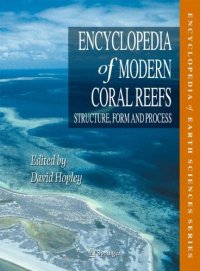
Ebook: Encyclopedia of Modern Coral Reefs: Structure, Form and Process
- Genre: Geography
- Tags: Biogeosciences, Physical Geography, Freshwater & Marine Ecology, Climate Change Impacts
- Series: Encyclopedia of Earth Sciences Series
- Year: 2011
- Publisher: Springer Netherlands
- Edition: 1
- Language: English
- pdf
Coral reefs are the largest landforms built by plants and animals. Their study therefore incorporates a wide range of disciplines. This encyclopedia approaches coral reefs from an earth science perspective, concentrating especially on modern reefs. Currently coral reefs are under high stress, most prominently from climate change with changes to water temperature, sea level and ocean acidification particularly damaging. Modern reefs have evolved through the massive environmental changes of the Quaternary with long periods of exposure during glacially lowered sea level periods and short periods of interglacial growth. The entries in this encyclopedia condense the large amount of work carried out since Charles Darwin first attempted to understand reef evolution. Leading authorities from many countries have contributed to the entries covering areas of geology, geography and ecology, providing comprehensive access to the most up-to-date research on the structure, form and processes operating on Quaternary coral reefs.
Coral reefs are the largest landforms built by plants and animals. Their study therefore incorporates a wide range of disciplines. This encyclopedia approaches coral reefs from an earth science perspective, concentrating especially on modern reefs. Currently coral reefs are under high stress, most prominently from climate change with changes to water temperature, sea level and ocean acidification particularly damaging. Modern reefs have evolved through the massive environmental changes of the Quaternary with long periods of exposure during glacially lowered sea level periods and short periods of interglacial growth. The entries in this encyclopedia condense the large amount of work carried out since Charles Darwin first attempted to understand reef evolution. Leading authorities from many countries have contributed to the entries covering areas of geology, geography and ecology, providing comprehensive access to the most up-to-date research on the structure, form and processes operating on Quaternary coral reefs.